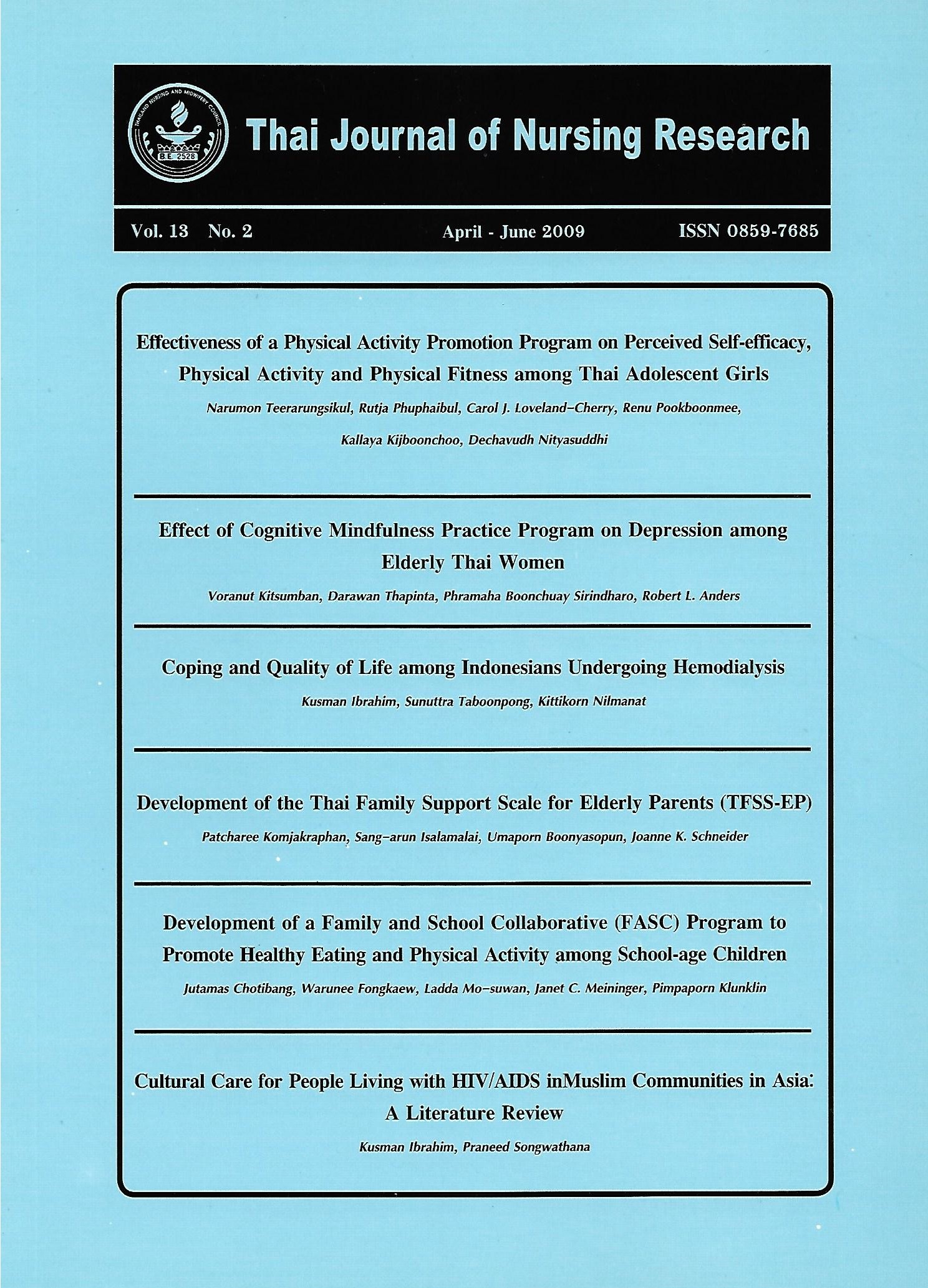Effectiveness of a Physical Activity Promotion Program on Perceived Self-efficacy, Physical Activity and Physical Fitness among Thai Adolescent Girls
Keywords:
หญิงวัยรุ่น, การรับรู้ความสามารถตนเอง, การเคลื่อนไหวออกแรง/ออกกำลังกาย, สมรรถภาพทางกาย, adolescent girls, perceived self-efficacy, physical activity, physical fitnessAbstract
บทคัดย่อ
การวิจัยครั้งนี้เป็นการศึกษาแบบกึ่งทดลอง มีวัตถุประสงค์เพื่อศึกษาผลของโปรแกรมส่งเสริมการออกกำลังกายต่อการรับรู้ความสามารถในการออกกำลังกาย การออกกำลังกายและสมรรถภาพทางกายของหญิงวัยรุ่น กลุ่มตัวอย่างเป็นหญิงวัยรุ่นชั้นมัธยมศึกษาที่ 1 และ 2 จากโรงเรียนรัฐบาล 2 แห่งในจังหวัดชลบุรีกลุ่มทดลองได้รับการสุ่มอย่างง่ายจากหนึ่งโรงเรียน ที่เหลือเป็นกลุ่มควบคุม ทั้งสองกลุ่มได้รับความรู้ทั่วไปเกี่ยวกับการเคลื่อนไหวออกแรง และออกกำลังกาย แต่กลุ่มทดลองได้รับโปรแกรมส่งเสริมการออกกำลังกายเพิ่ม ซึ่งใช้กรอบแนวคิดการส่งเสริมสุขภาพของเพนเดอร์ และทฤษฎีการรับรู้ความสามารถของแบนดูร่า เก็บรวบรวมข้อมูลก่อนได้รับโปรแกรมสัปดาห์ที่ 8 หลังสิ้นสุดโปรแกรม และสัปดาห์ที่ 12
ผลการศึกษาพบว่ากลุ่มทดลองมีระดับการรับรู้ความสามารถในการออกกำลังกาย การออกกำลังกายและกิจกรรมการเล่นสูงกว่ากลุ่มควบคุมในสัปดาห์ที่ 8 แต่พฤติกรรมเหล่านี้ไม่สามารถคงอยู่ถึงสัปดาห์ที่ 12 นอกจากนี้นสมรรถภาพทางกายของหญิงวัยรุ่น ทั้งสองกลุ่มไม่แตกต่างกันทั้งสัปดาห์ที่ 8 และ 12 ผลการศึกษานี้เสนอแนะถึงประสิทธิภาพของโปรแกรมส่งเสริมการออกกำลังกายในหญิงวัยรุ่น มีผลต่อการเพิ่มการรับรู้ความสามารถในการออกกำลังกายและการออกกำลังกายของหญิงวัยรุ่นในสัปดาห์ที่ 8 หลังสิ้นสุดโปรแกรม ดังนี้นจึงควรนำโปรแกรมนี้ลงสู่การปฏิบัติเพื่อส่งเสริมการรับรู้ ความสามารถในการออกกำลังกาย และการออกกำลังกายของหญิงวัยรุ่นในโรงเรียนต่อไป เพราะทำให้หญิงวัยรุ่นสนใจและเข้าร่วมกิจกรรมการออกกำลังกาย แต่ควรพัฒนาโปรแกรมเพื่อติดตามระดับการรับรู้ความสามารถของตนเองในการออกกำลังกาย และการออกกำลังกายให้ดำรงอยู่ต่อไป รวมทั้งการเพิ่มสมรรถภาพทางกาย
คำสำคัญ: หญิงวัยรุ่น, การรับรู้ความสามารถตนเอง, การเคลื่อนไหวออกแรง/ออกกำลังกาย, สมรรถภาพทางกาย
Abstract
The purpose of this quasi-experimental study was to investigate the outcomes of a physical activity promotion program on perceived self-efficacy, physical activity and physical fitness among Thai adolescent girls. The study sample was recruited from grades seven and eight in two public schools in Chonburi province, Thailand. Simple random assignment was used to assign students from one school as the experimental group and students from the other school as the control group. Both groups received general information on physical activity. However, the experimental group also received the physical activity promotion program based on Pender’s Health Promotion Model and Bandura’s Self-efficacy Theory. Data were collected at baseline, on the eighth week when the intervention ended, and on the 12th week.
The results revealed that, by the eighth week, the experimental group’s scores for perceived self-efficacy, physical activity and light activity were significantly higher than those of the control group. However, these effects could not be maintained by the 12th week. Furthermore, the physical fitness scores were not significantly different between the experimental and control groups at the eighth and 12th weeks.
The findings suggest the program resulted in short-term enhanced perceived self-efficacy and physical activity, among Thai adolescent girls, at eight weeks post-intervention. Therefore, implementation of this program to promote perceived self-efficacy and physical activity, among adolescent girls in school, is encouraged since the students became interested and active in participating in the activities. However, this program should be further developed to sustain changes in perceived self-efficacy and physical activity, including increased physical fitness.
Key words: adolescent girls, perceived self-efficacy, physical activity, physical fitness
Downloads
How to Cite
Issue
Section
License
Copyright: The Pacific Rim International Journal of Nursing Research, Thailand Nursing & Midwifery Council has exclusive rights to publish, reproduce and distribute the manuscript and all contents therein.








.png)



